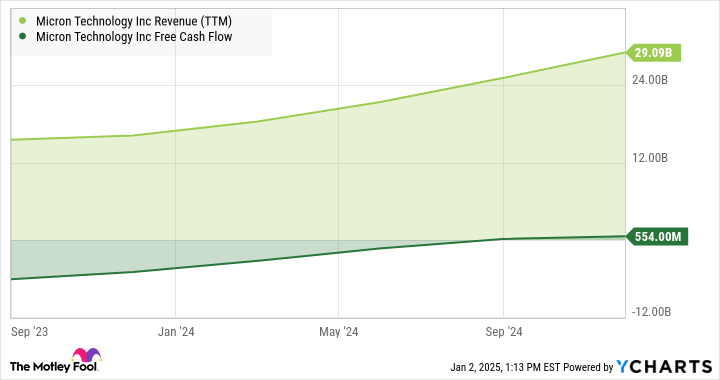The S&P 500 up over 55% in the last two years. Naturally, investors are likely wondering how much longer the bull market rally can go.
Although no one knows what will definitively happen this year, it's clear the broader market has gotten more expensive. So it's even more important to ensure you are investing in top companies that you are willing to hold through periods of volatility.
Here's why these five Fool.com contributors have high conviction in Alphabet (GOOG 1.31%) (GOOGL 1.25%), Micron Technology (MU 2.91%), Brookfield Renewable (BEP 0.39%) (BEPC 1.64%), PepsiCo (PEP -0.37%), and United Parcel Service (UPS -0.07%) as top stocks to buy this month.

Image source: Getty Images.
An obvious winner in the year of AI agents
Keith Speights (Alphabet): Many analysts believe 2025 will be the year of artificial intelligence (AI) agents. I agree. And I think Google parent Alphabet will be an obvious winner if that prediction is right -- and therefore a great stock to buy to start the year.
AI agents can perform self-directed tasks to achieve goals set by humans. Instead of only answering questions as chatbots do, they can also go to work on your behalf.
Why is Alphabet such an exceptional pick to profit from the rise of AI agents? For one thing, the company already offers robust AI agent functionality. Its Gemini large language model (LLM) supports application programming interfaces (APIs) for running AI agents. Google Cloud's Vertex AI Agent Builder makes creating AI agents quick and easy. Google Agentspace supports enterprise-level AI agents.
Alphabet's ecosystem presents a massive opportunity for deploying AI agents, too. The potential applications of AI agents across Google's product range, including Android, Google Pixel phones, and Google Workspace productivity suite, are extensive and readily apparent.
I also like that Alphabet is the biggest bargain among the so-called "Magnificent Seven" stocks based on one key valuation metric. The tech giant's shares trade at only 21.3 times forward earnings, lower than the forward earnings multiples of the other members of the Magnificent Seven.
Could regulatory threats derail Alphabet's momentum? Maybe, but I suspect not. Alphabet is appealing an adverse court decision handed down in 2024. I think the company's arguments look pretty solid. Alphabet ranks among the best AI stocks to buy right now, in my opinion.
Micron's $50 billion investment is building America's tech future
Anders Bylund (Micron Technology): I love companies with a long-term vision. Micron Technology is a great example.
The memory chip maker isn't planning ahead for the next quarter or even the next year. Micron is building an America-centered manufacturing network for the long haul, expecting to invest $50 billion in new and upgraded facilities by 2030.
The company is building an American tech titan for the ages, and having this crucial hardware provider available should grow more important in the coming years. Micron's world-class memory chips are often seen in the latest AI accelerators from Nvidia and Advanced Micro Devices, for example. Apple sources the iPhone's memory chips from various leading suppliers, but Micron is among them and is reportedly in talks to secure a larger iPhone contract in 2026.
Micron's long-term business prospects are downright incredible. At the same time, the company is returning from a multiyear downturn, which started with coronavirus-based materials and engineering talent shortages in 2020. Trailing-12-month revenue has nearly doubled since the summer of 2023, and Micron's free cash flows are back above the breakeven line again -- despite the company's expensive factory-building efforts:

MU Revenue (TTM) data by YCharts.
But Wall Street isn't paying attention to Micron's shareholder-friendly business trends. The stock soared and then plunged in 2024, adding up to a full-year price drop of 1.4%. That includes a 14% plunge in December. Micron's shares are trading at the bargain-bin valuation of 3.3 times sales or 7.6 times forward earnings as of Jan. 2.
It's a deal, it's a steal, it's a deep-discount sale you don't want to miss in January 2025.
An attractive, beaten-down stock
Neha Chamaria (Brookfield Renewable): Shares of Brookfield Renewable hugely underperformed the S&P 500 in 2024 -- while the corporate shares gained barely 4% in the year, units of the partnership fell 13% versus the S&P 500 index's 23% gains. However, there seems to be a disconnect between investor sentiment and Brookfield Renewable's operational performance and growth goals. I believe the stock has a solid chance to recover and rally in 2025.
Brookfield Renewable is one of the world's largest publicly traded renewable energy companies, with an operating capacity of nearly 37 gigawatts (GW). The company, however, is developing nearly 200 GW of capacity, reflecting its massive growth potential. More importantly, Brookfield Renewable is steadily growing its cash flows and dividends.
Brookfield Renewable is, in fact, all set to deliver record numbers for 2024, with its funds from operations (FFO) per unit growing by 11% in the third quarter. That puts the company on track to deliver 10%-plus annual FFO per unit growth in line with its long-term goal.
The real highlight, though, is that 2024 should also be the biggest year for investments into growth for Brookfield Renewable, with the company raising billions of dollars from asset recycling and investing that money, alongside cash flows, into global acquisitions spanning wind, solar, and hydroelectric power assets.
Given the backdrop, Brookfield Renewable looks like a solid stock to buy in January and hold for 2025 and beyond. The company plans to grow dividends at a rate of 5% to 9% per year, and its shares currently yield a solid 5% yield. As an investor in the U.S., you could avoid filing a K-1 tax form and foreign tax withholding if you buy corporate shares of Brookfield Renewable versus its partnership units.
Snack on this stock
Demitri Kalogeropoulos (PepsiCo): It's a new year, making it an ideal time to take a fresh look at your portfolio. That's especially true following two fantastic years for broader stock market returns. If you do, you might find that PepsiCo fits as one of your first purchases of 2025.
The beverage and snack foods giant underperformed the S&P 500 by a wide margin in 2024. That's partly because Wall Street was more interested in tech giants and companies engaged in the AI space. But Pepsi also reported some sluggish sales figures as its core consumer pulled back their spending to save cash. Organic sales growth was just 2% through the first three quarters of the year, management revealed in early October. Compare that to the 10% spike investors saw in 2023 and the 14% surge in the prior year, and it's easy to see why some investors have been disappointed.
But Pepsi is still a cash- and profit-generating machine, which means there's a good chance at a rebound for this business -- and for its stock returns -- over the next several years. CEO Ramon Laguarta and his team are projecting a bit less than 4% organic sales growth for the 2024 year and 8% higher earnings per share in that period. Investors will learn the exact figures, plus Pepsi's initial outlook for 2025, when the company announces Q4 results on Feb. 4.
In the meantime, there's every reason for shareholders to expect ample direct cash returns from this business as Pepsi sells more snack foods and beverages. For 2024, expected returns of cash to shareholders were billed at $8.2 billion, mainly through dividend payments.
Speaking of dividends, Pepsi's yield is back above 3.5%, a rate investors haven't seen since the early days of the pandemic. That unusually high payout, along with Pepsi's solid earnings generation, should help cushion returns while investors wait for a growth rebound. The timing of any sales recovery is a big question mark. But Pepsi's dividend payment is not. The Dividend King has hiked its payout in each of the last 51 consecutive years, and it's almost certain that shareholders will benefit from another increase in 2025.
UPS has what it takes to recover in 2025
Daniel Foelber (UPS): UPS is now at its lowest level since July 2020, and I think it's an incredible opportunity for patient investors. But there's no denying the package delivery giant has fallen for many good reasons.
The COVID-19 pandemic initially led to surging volumes and margins for UPS. However, as industrywide growth slowed, UPS struggled to offset declining margins with price increases, further hurting volumes. The company was also dealing with expensive negotiations with the Teamsters Union, which resulted in a new contract. Even as UPS laps initial costs of the new contract, analysts expect its earnings per share to rise by 17% in 2025. UPS made several blunders in recent years and disappointed investors. But the stock has fallen far enough, and UPS is well positioned to return to growth in 2025.
The company has already made significant investments in expanding routes, so it doesn't have to spend a lot on capital expenditures (capex). In fact, capex is expected to be just $4 billion in 2024, which is less than the $5.4 billion in projected dividends. After 18 months, UPS finally returned to profit and revenue growth, so it is already showing signs of turning things around.
Longer-term, UPS has opportunities to expand its healthcare and small and medium-sized delivery volumes. In March 2024, UPS unveiled a three-year plan that forecast healthcare segment revenue to double by 2026, making time- and temperature-sensitive shipments an integral part of the company's offering.
UPS and its peer FedEx have dirt cheap valuations, but UPS has a far higher yield at 5.3%, making it a more intriguing transportation stock for passive-income investors.
Investors looking for high-yield dividend stocks at compelling valuations should look closer at UPS now.






